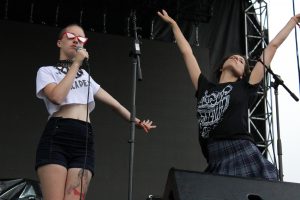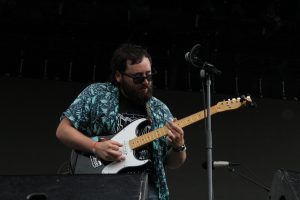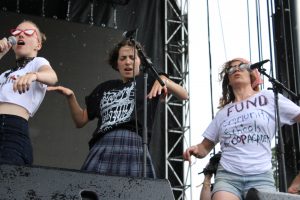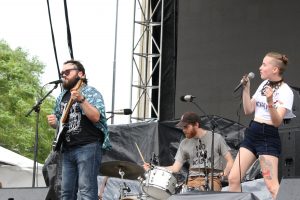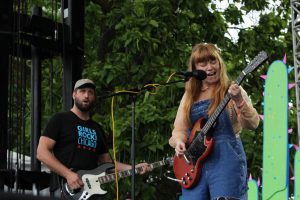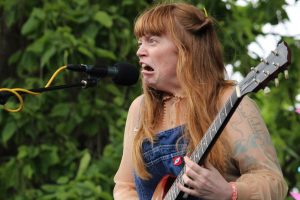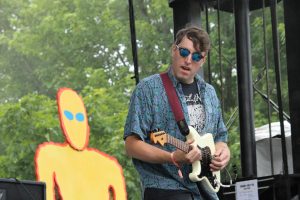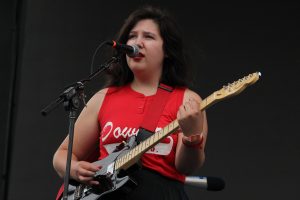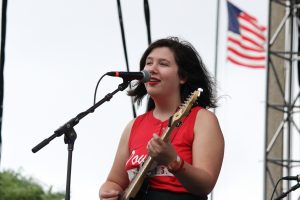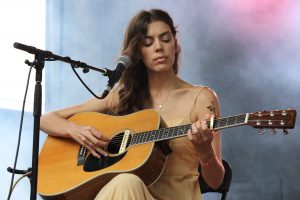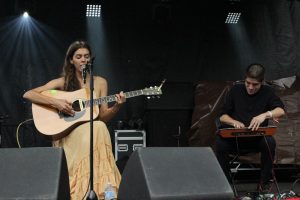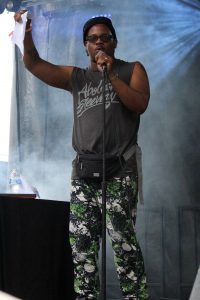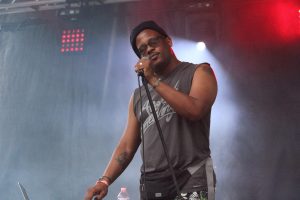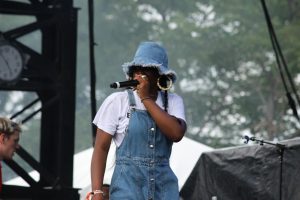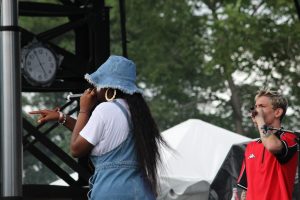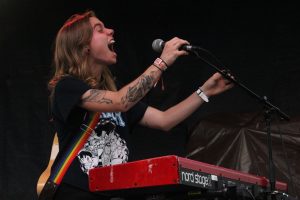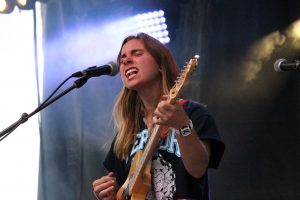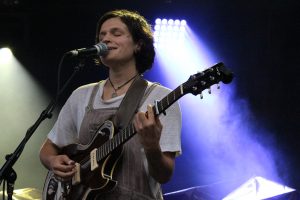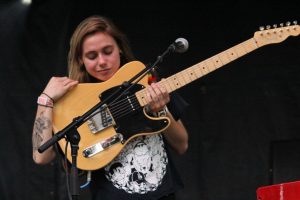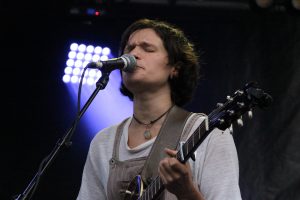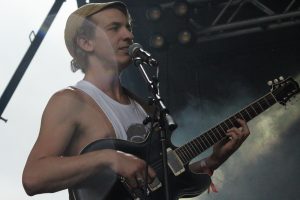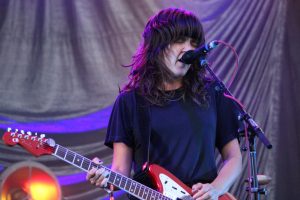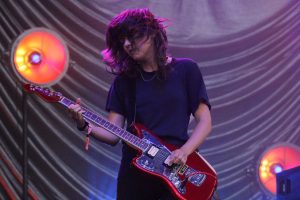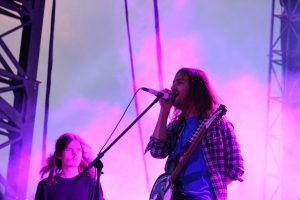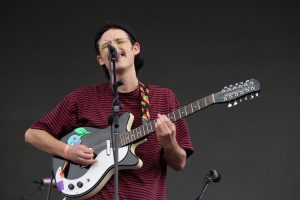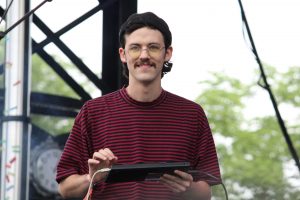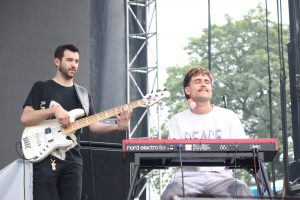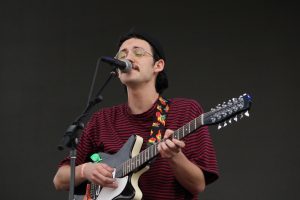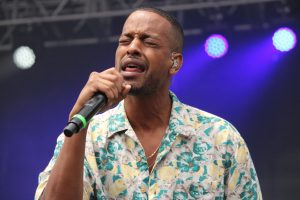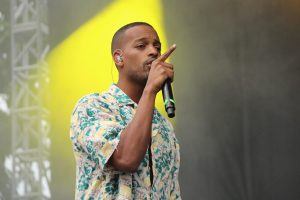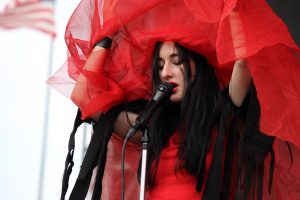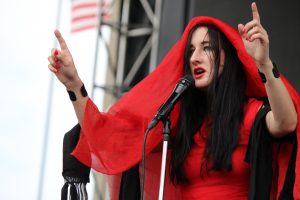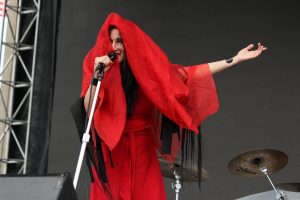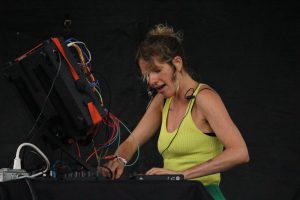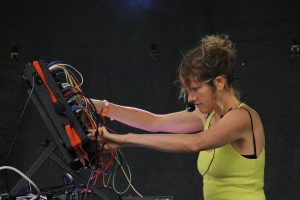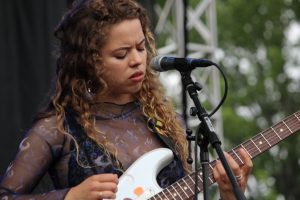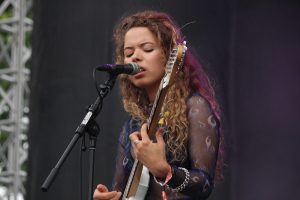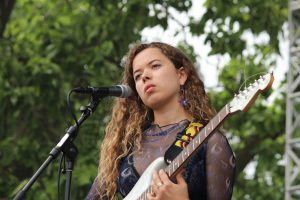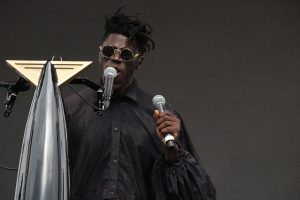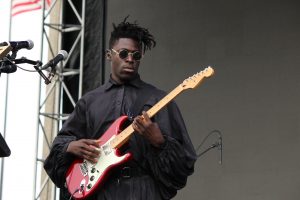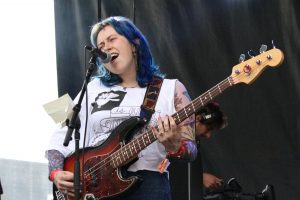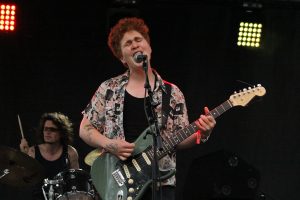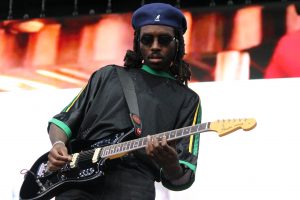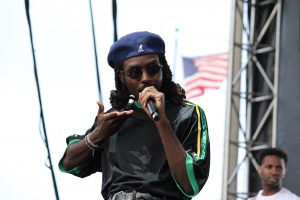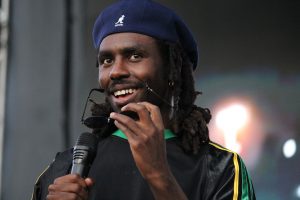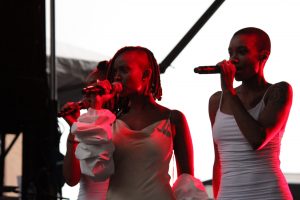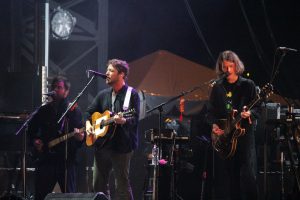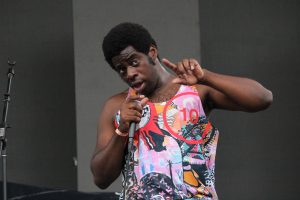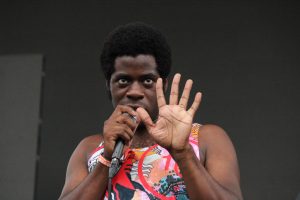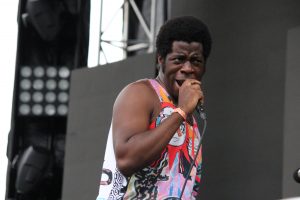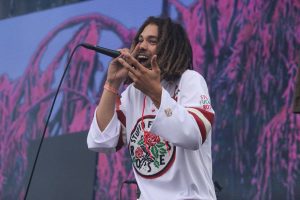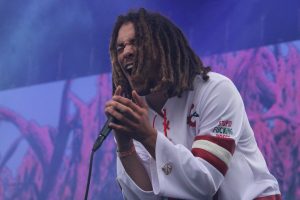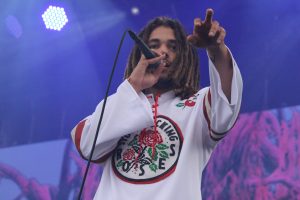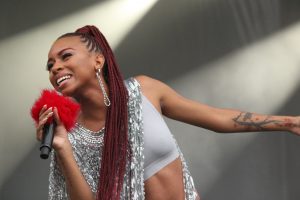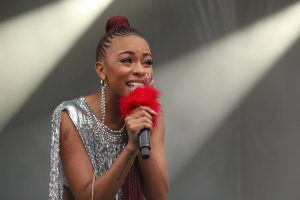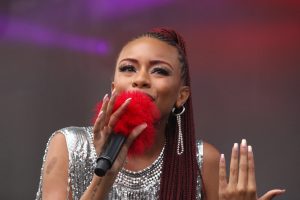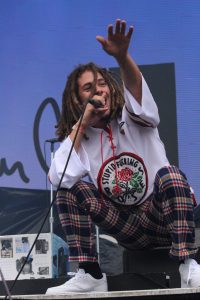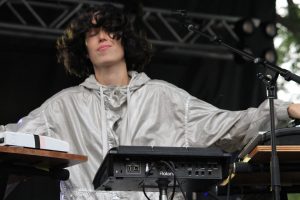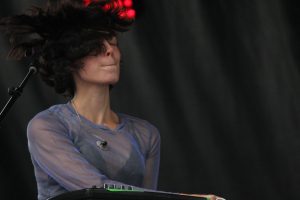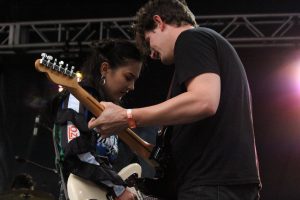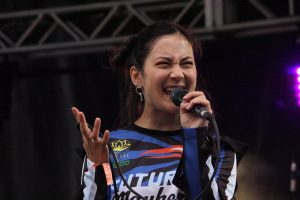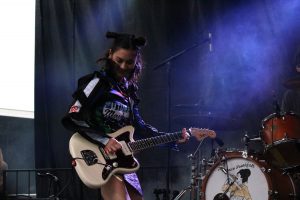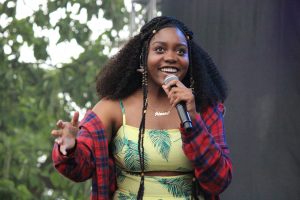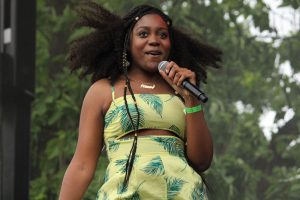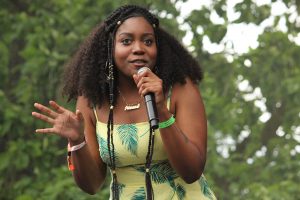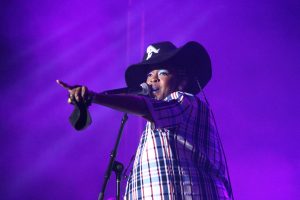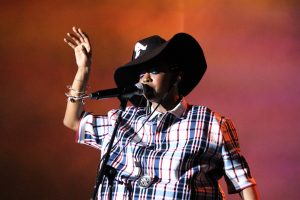WUOG went out to Pitchfork Festival this year in Chicago! Besides taking countless free Cliff bar and Bai snack breaks, we also caught some great sets. Check out our weekend to see the artists who exceeded expectations, surprised, and even disappointed.
Day 1

The Curls
The Curls delightfully played the first note and set of Pitchfork Fest 2018. With backup dancers, singers, and an expanded horn section beyond their normal six person lineup, there was a lot of action accompanying their funk-ed out art rock. It was easy to bop along, especially to the breezier songs like “Tidal Wave,” but The Curls also came to Pitchfork to make a political statement, and that came in the form off all members wearing No Cop Academy shirts. Their activism and carefree fun set a perfect tone for the entire weekend.
-Tori Benes

Melkbelly
Melkbelly is a no frills kind of band. The band decorated the stage with several elements from the artwork of their debut record Nothing Valley, but beyond that, they left the frivolity to others. Fronted by Miranda Winters, Melkbelly funneled all attention to the intensity of their music, only taking a break to shout out the the Chicago DIY representation on the lineup. Jerked movements often accompanied their thrashing noise rock, but Miranda Winters voice sonically reigned supreme, transforming from deadpan belts to blood-curling bursts. Watching, Melkbelly’s set felt like being a smug organizer of doomsday, and boy, did it feel cool.
-TB

Lucy Dacus
After Melkbelly confidently pummeled their way through the rain early on the festival’s opening day, I headed toward the main stage where Lucy Dacus was next to play. Dacus didn’t handle the rain well, rushing though the beginning of her set expressing her worries. After suddenly moving her debut’s hit “I Don’t Wanna Be Funny Anymore” to the 3rd song of her set, the rain came to a halt from the light drizzle it was before, and Dacus got more into her performance. The set highlighted the excellent songwriting on this years Historian and her personality shined through, bringing up the anecdote of seeing Kendrick Lamar perform at the same stage a few years back. “Thank you to everyone singing along, it makes me feel like I belong here,” she said before closing her set with the anthemic “Night Shift.” Despite the shaky start, Dacus didn’t just feel like she belonged on the main stage, she proved it.
-Stan Standridge

Julie Byrne
After idling around Lucy Dacus’ performance for a song or two, I decided to commit to the chaotic transition of heading fresh off of Melkbelly’s set to Julie Byrne’s. Bryne arrived on stage like a rose blossoming in the desert, and I instantly knew I made a right call. Much of her blue stage time was spent like a confessional, just her, a guitar, and a mesmerized crowd, but a band featuring a harp, violin, and a synthesizer also joined her for several songs. With both arrangements, her mellow folk was crystalline, and Julie Byrne performed as a woman who had peacefully found her center.
-TB

Open Mike Eagle
Open Mike Eagle immediately admitted that he was incredibly anxious to play on the Pitchfork stage, even with it’s hometown location. As down to earth as they come, Open Mike dealt with his nerves by performing a rap of a new song about anxiety, which was scrawled on his setlist, throwing in a few freestyled lines about the rainy weather. Open Mike performed tracks mostly off Brick Body Kids Still Daydream and spent time between cuts welcoming and initiating the crowd into a new support group he called the 1993 Chicago Bulls. The Open Mike support group joke reached its climax when he brought Serengeti out to sing the unofficial Chicago anthem, “Dennehy” (“Bears, Hawks, Sox, Bulls!”). He spent a share of his time making sure the crowd was having a good time, but beyond this, he cultivated a space in which he, a Chicago artist, was able to lyrically confront Chicago issues and share his childhood experiences growing up in this city, and the small-scale representation of Chicago in Union Park was quick to embrace him with open arms.
-TB

Tierra Whack
I rushed over to the end of Tierra Whack’s set just in time to catch her sing “Cable Guy,” “Hungry Hippo,” and run through a freestyle. With bubblegum hooks, Whack commanded attention as she marched across and the stage and flirted with the audience through her witty improvisation. I was ecstatic to see part of Whack’s set but the mere brevity of her tracks leaves me wondering how she filled her time slot and wishing I had seen more.
-TB

Julien Baker
Walking up to Julien Baker’s set I was indifferent. I’ve given both of her records a chance, but never developed a real interest in her music. By the chorus of her set opener, “Turn Out the Lights” that drastically changed. Her voice was chill-inducing. Baker’s as vulnerable of a performer as they come, singing songs about rejection and hurt as the lone musician onstage, but she also delivered every syllable with defiance. As she belted out her songs, it seemed as if Baker was finding acceptance in her demons, and in the process, she made an invested fan out of me.
-TB

Big Thief
Big Thief delivered a warm aura Friday evening as the cloudy Chicago skies drizzled down on fans. They opened their set with “Masterpiece,” followed by the powerful “Shark Smile” from 2017’s Capacity. The band slipped in “Mary” and “Real Love,” to their set and dedicated the remainder of time to new material. Adrianne Lenker and Buck Meek proved to be the most humble and cozy front-folks, but it was a slight letdown to see a Big Thief set missing so many of their powerful, emotional songs like Capacity‘s “Mythological Beauty.” Big Thief’s lyrics demand to be felt, and attempting to process new songs in a festival setting ended up being challenging.
-TB
Closing the smaller Blue Stage on Friday, English electronic act Mount Kimbie hit the crowd with plenty of cuts from their post-punk tinged Love What Survives. Armed with four members on stage, they easily bought these songs to life. The album highlight “Marilyn” made for an excellent centerpiece to their set with the emotive synth lines locking you into a groove. While some tracks felt a bit lackluster without their featured vocalist present, the lack of King Krule on “Blue Train Lines” being most obvious, they still managed to give an energetic performance.
-SS
Day 2

Paul Cherry
The person most surprised that Paul Cherry was on this year’s lineup up was probably, well, Paul Cherry. He was not hesitant to admit that, but he keep his jazzy, and sometimes even yacht rock reminiscent, bedroom pop at its tightest and most exciting despite his nerves. The band comfortably jammed a little and added flourishes, especially with percussive layers. Paul Cherry appeared touched, but also still in disbelief for much of his set, but with the way he performed, he best believe he deserved that festival invitation.
-TB

Berhana
The lesson to be learned from Berhana’s set was that there’s a severe shortage of male-identifying folk crooning about love in respectful, non-possessive ways these days. Berhana’s cover of Wreckless Eric’s “Whole Wide World” left me with that realization, and with his effortless vocal flows, left me yearning for more. The R&B singer just has an EP from 2016 under this belt, sadly lacking crooning love songs, but his release does offer a equally-satisfying unique snapshot of his life, which Berhana performed to a tee. Berhana came through for a sweet set, and he’s definitely one to watch; you’re going to want a taste.
-TB

Zola Jesus
Goth really has made a comeback in 2018, and if Zola Jesus’s set at Pitchfork this year is any indication, it is here to stay. Backed by just a violinist, a guitarist, and a pounding drum machine, her powerful vocals shined through. Sporting some of the more jerky dancing of the weekend, the theatrics of the performance were only outdone by the theatrics of the music, the dense string arrangements on “Exhumed” being more ready for an Italian cathedral than an outdoor festival in downtown Chicago. Nevertheless, Zola Jesus climbed down from the stage and used the middle walkway as her own gothic dancefloor, making for an exciting mid-afternoon set.
-SS
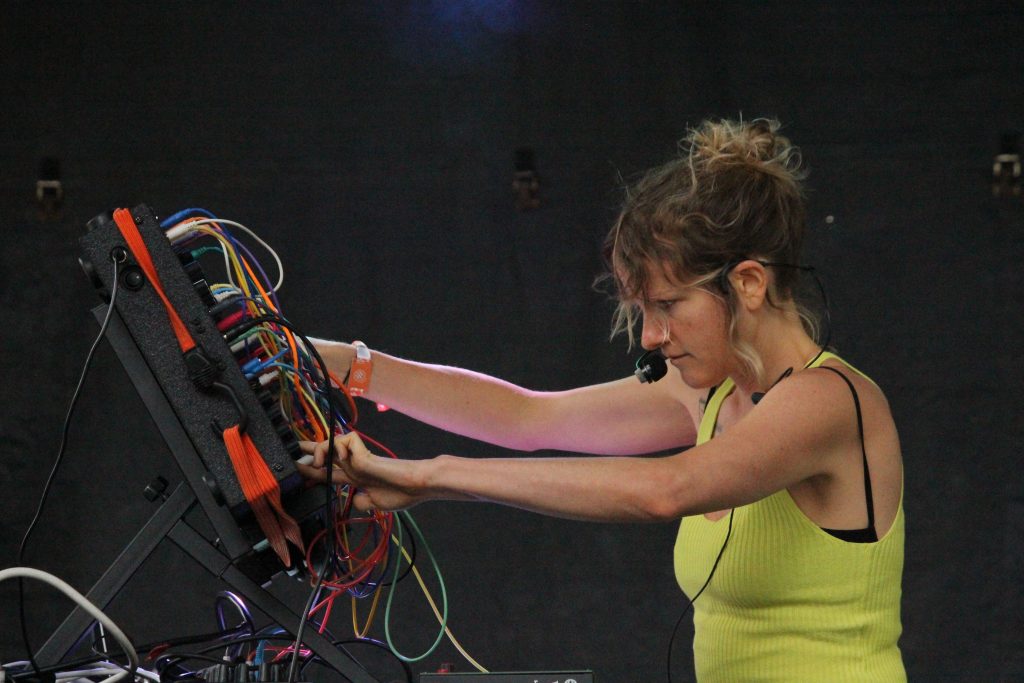
Kaitlyn Aurelia Smith
I left Zola Jesus’ theatrical, high-energy set early on with the intention of immersing myself in the lush, textural soundscape that is Kaitlyn Aurelia Smith’s spacey music. I can’t deny that Smith’s live performance sounded like a pretty spot-on replication of her recorded music, but a dimension of vibrancy was missing in the live delivery. Smith spent the entirety of her set cooped up in front of her switchboard-like equipment, never engaging with her audience. While I find Smith’s recent records captivating, her set proved to be disenchanting, and unfortunately left me full of regret for leaving Zola Jesus.
-TB

Moses Sumney
I had my reservations going into Moses Sumney’s set on Saturday afternoon. His music, while extremely beautiful, doesn’t seem as though it would work well in a traditional concert setting. Sumney proved me wrong almost immediately. Armed with a live band and three microphones, he looped and warped his distinct vocals through a variety of effects throughout his set. Sumney doesn’t rely at all on these effects, however, they merely amplify his already incredible voice. It almost felt rude to sing along throughout the entire set. Once “Quarrel” reached its climax, Sumney’s drummer pounding dramatically over the vocal loops, I was hooked. The dramatics carried into the cover of Bjork’s “Come to Me,” where Sumney himself came down to the crowd and sang directly to a starry-eyed fan. Closing with a lively take on “Lonely World” and fan-favorite “Plastic,” Sumney showed that his ambient pop had plenty more bite hidden under the beauty.
-SS

Girlpool
Girlpool started as just a pair of friends in high school making music with a bass and a guitar. A simple start. The founding members, Cleo Tucker and Harmony Tividad, have shared three releases as Girlpool thus far and have added additional instrumentation since their start, but at the bones of their project is the same authenticity they began playing music with. Last year, Tucker came out as non-binary, and it was beautiful to see how Tucker and Tividad’s vocal harmonies have evolved as Tucker becomes more comfortable in their own skin. Another instance of authenticity. The duo presented clear onstage chemistry and synchronicity as bandmates and friends and this dimension of genuiness, something that’s been ever present in their recorded music, made their set both memorable and touching.
-TB

Blood Orange
While tracks like “Best To You” from 2016’s Freetown Sound and the Cupid Deluxe hit “You’re Not Good Enough” are excellent, I only ended up at Blood Orange’s set for a good spot for Fleet Foxes later that night. I never would’ve expected that Devonté Hynes and co. would put on such an enjoyable show. Backed by footage of street races and mid-2000’s music videos, my unfamiliarity with Blood Orange non-hits didn’t hinder my experience much at all. Opening with a barebones piano backed take on Sky Ferreira’s “Everything is Embarrassing” and easing his full band in on “Desirée”, I found myself more into the groove of their Prince-esque alt R&B than I ever was when listening on record. The unreleased tracks they played from the upcoming Negro Swan have me heavily anticipating the album itself. While Hynes himself could’ve easily carried the show himself, near everyone he shared the stage with was given ample time to show off, from the guitar break on “Champagne Coast” to the many saxophone sections on both old and new tracks, everyone on stage seemed an essential part to the Blood Orange formula.
-SS
Day 3

Nnamdi Ogbonnaya
Due to a late start time that was publicized as a “weather precaution,” but sounded a lot like Ms. Lauryn Hill’s soundcheck, Nnambi Ogbonnaya’s Pitchfork debut was unfortunately delayed, and as a result, cut five songs short. Despite this frustration, Ogbonnaya didn’t waste anytime. Accompanied by a horn section, including rising Chicago musician Sen Morimoto on saxophone, and a pair of backup singers, Ogbonnaya jumped right into his genre-fusing material from DROOL and beyond with an added layer of flair from the special instrumentation. Ogbonnaya has had more impactful sets, but considering the circumstances and the fact that Ogbonnaya is such a musical innovator, his live performances always deserve to turn heads. Not to mention if you direct your attention at the right moment, you might catch some of Ogbonnaya’s manic movements.
-TB

Kweku Collins
I saw Kweku Collins last fall and left unimpressed, but from the portion of his set I saw, it’s time to give Collins another chance. Collins was confident and exploded with an energy, and th that crowd was quick to mirror his enthusiasm.
-TB

Kelly Lee Owens
People have been telling me for ages that I need to get into Kelly Lee Owens, and I kept thinking to myself I’d get to it later. My first exposure to her ended up being this performance. While I showed up about 15 minutes into her set, the crowd was already dancing more than I saw at any other crowd during the fest. Despite Owens being onstage with just herself, a laptop, and plenty of boards, she knew how to play to the crowd. It’s hard not to groove to her minimal house tracks when you see how much she gets into them herself, and I was quickly sucked into her set. Between her spacy vocals and yelps, the pounding bass, and the catchy repetitive synth leads, Owens crafted one of the finest dance parties of the weekend.
-SS

Ravyn Lenae
Ravyn Lenae was dressed in a shining silver outfit, and the only thing that sparkled more was Ravyn Lenae’s stage presence. Lenae glided from track to track with her silky smooth voice and sweetly spoke of the experiences of love came to inspire songs on Crush. The 19-year-old, had the crowd promise to move their bodies and sing her lyrics early on and by the end of her set, even the most stubborn obliged.
-TB

Japanese Breakfast
I’m sure I sound like a broken record at this point, but I’ll rave about Japanese Breakfast, both the live show and the recorded music, to anyone in who will listen. Unsurprisingly, the band delivered another top notch set, perfect to add to my Jbrekkie testimonial. Delivering hit after hit, mostly from 2017’s Soft Sounds From Another Planet, Michelle Zauner threw her name in the hat for the most dynamic frontwoman in current years. The whirling instrumentals set the perfect tone for an exploration of the cosmos, and Zauner already seemed to be benefiting from outer space-levels of gravity, literally bouncing across the small blue stage with immense energy. While much of Zauner’s lyrical content deals with strained relationships and loss, I didn’t see another set all weekend at the blue stage where so many people were dancing, just like Zauner. Japanese Breakfast was otherworldly, definitely in need of a bigger stage, and maybe even a bigger planet.
-TB

Noname
With a joyous energy, Noname took the stage, perhaps the largest she’s played, for a hometown crowd. Grinning ear to ear, Noname delivered track after track off of Telefone, complete with appearances from featured artists Ravyn Lenae, Joseph Chilliams, Smino, and Saba. The crowd even nearly got an acapella performance of a new track—curse that smoked joint that made her forget the words! Her set further proved that Noname is one of the most refreshing young voices in the industry these days, and new material can’t come soon enough.
-TB

(SANDY) Alex G
Alex Giannascoli’s brand of bedroom pop has always had some slight country leanings, and that was made all the more apparent by his set on the Blue Stage Sunday evening. Walking out to the classic “Life Is a Highway,” he and his band quickly hopped into “Kute” from 2012’s Trick. Sporting a cleaner sound than on record, his post-country tinges came through strong. Once the band shifted into playing “Bobby,” the cowboy really came out. The set wasn’t without some twists, such as bringing Japanese Breakfast’s Michelle Zauner out for a duet of “Bright Boy” and the mosh pit bait “Brick.” These moments of spontaneity amplified Alex G’s otherwise solid set into something quite memorable.
-SS
The set with the most palpable gay energy this weekend was easily the legendary Chaka Khan. Well into her 60s, the Queen of Funk worked her way through plenty of her more lively hits as both the frontwoman of Rufus and her solo career. While often the more complex vocal runs were left to her incredibly talented background vocalists, Chaka Khan held her own and delivered some great vocal performances. The anthemic “I’m Every Woman” had the whole crowd belting along. Between crowd interaction, prince covers she made her own, and excellent instrumental interludes, Chaka Khan added another layer of cement to her already renowned career.
-SS

Ms. Lauryn Hill
Early in the weekend, I heard from other photographers that Ms. Lauryn Hill was a big diva. Who knew if she would show up an hour late, or even at all. After hearing her soundchecking early afternoon (and delaying the gate opening time in the process), it was clear she had arrived so now the major question was how long the wait time would be. It turned out to be slightly over 20 minutes, but real talk, if I knew how moving her set would turn out to be, I would have be less impatient in the photo pit while her DJ spun records for those 20 plus minutes. Ms. Lauryn Hill was for sure a diva, constantly directly her band and backup singers, bugging the sound engineers, but she also commanding the crowd in a way that only someone with that much attitude could. Her meticulously crafted performance was flawless and emotionally dominated. It was remarkable to see such an attentive festival crowd, and for me, Ms. Lauryn Hill’s set was the third set to give me chills, first as “Forgive them Father” waxed to its fullest dimension, and second when she spoke of the challenges and dreams around the creation of The Miseducation of Lauryn Hill. Ending with “Doo Wop (That Thing),” Ms. Lauryn Hill amazed as a MC and delivered her legendary hook for a thrilling close to this year’s festival.
-TB
All photos by Tori Benes.
- The Curls
- The Curls
- The Curls
- The Curls
- Melkbelly
- Melkbelly
- Melkbelly
- Lucy Dacus
- Lucy Dacus
- Julie Byrne
- Julie Byrne
- Open Mike Eagle
- Open Mike Eagle
- Open Mike Eagle
- Tierra Whack
- Tierra Whack
- Julien Baker
- Julien Baker
- Julien Baker
- Big Thief
- Julien Baker
- Big Thief
- Big Thief
- Courtney Barnett
- Courtney Barnett
- Courtney Barnett
- Tame Impala
- Tame Impala
- Tame Impala
- Paul Cherry
- Paul Cherry
- Paul Cherry
- Paul Cherry
- Berhana
- Berhana
- Zola Jesus
- Zola Jesus
- Zola Jesus
- Kaitlyn Aurelia Smith
- Kaitlyn Aurelia Smith
- Nilüfer Yanya
- Nilüfer Yanya
- Nilüfer Yanya
- Moses Sumney
- Moses Sumney
- Girlpool
- Girlpool
- Girlpool
- Blood Orange
- Blood Orange
- Blood Orange
- Kelela
- Kelela
- Kelela
- Fleet Foxes
- Nnamdi Ogbonnaya
- Nnamdi Ogbonnaya
- Nnamdi Ogbonnaya
- Kweku Collins
- Kweku Collins
- Kweku Collins
- Ravyn Lenae
- Ravyn Lenae
- Ravyn Lenae
- Kweku Collins
- Kelly Lee Owens
- Kelly Lee Owens
- Kelly Lee Owens
- Japanese Breakfast
- Japanese Breakfast
- Japanese Breakfast
- Noname
- Noname
- Noname
- (SANDY) Alex G
- (SANDY) Alex G
- Ms. Lauryn Hill
- Ms. Lauryn Hill
- Ms. Lauryn Hill


